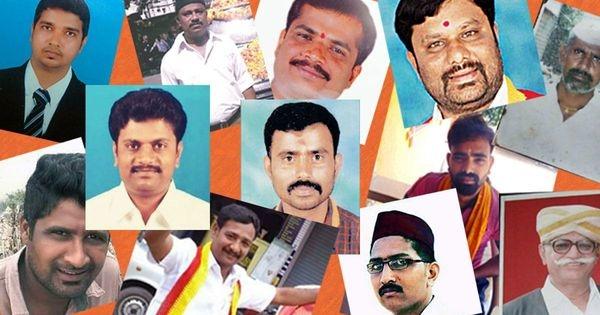Karnataka BJP’s ‘Jihadi’ Murder List and its Realities

Image Courtesy: scroll.in
As Karnataka goes to assembly polls in May 2018, the magnitude of election campaigns intensifies day by day. BJP, as always, is repeating its development rhetoric and strategies to polarize the people on the communal basis.
The BJP regime, that had begun its official election campaign on November 2, 2017, launched Nava Karnataka Nirmana Parivarthana Rally. The rally was concluded on February 8, 2018, covering all the 224 constituencies in the state, with a note by Prime Minister Modi. During his speech, Modi had said that though the entire world is busy with “ease of doing business” Congress is busy with “ease doing murders”.
The BJP brigade had begun their campaigns, far before, to polarize the state communally. On July 8, 2017, BJP member from Udupi-Chikkamagaluru Lok Sabha constituency, Shobha Karandlaje, had wrote a letter to Union Home Minister Rajnath Singh saying that 23 BJP/RSS/Hindu activists in various parts of Karnataka were murdered by “Jihadi elements” since 2014. Shobha, one of the close aides of former chief minister BS Yeddyurappa, emphasized in her letter that “It is a blood bath in Karnataka”.
In the letter, Shobha has listed the names of the victims saying that the needle of suspicion pointed at Muslim organizations. She also accused the Congress government in the state of shielding them. Following this, the BJP has been using the letter and the figures in their election campaigns. Simply put, the letter had given a momentum to the Sangh Parivar propaganda to communalize the state.
However, a very recent field report by Sruthisagar Yamunan exposes the false claims of the RSS/BJP brigade and their planned attempts to make communal conflicts in the state. According to Yamunan, one person, of the 23 names on Shobha’s list, is alive. Two men committed suicide and even the police investigation found that two men were allegedly murdered by their sisters.
To seek the reality of the list, the reporter even traveled through the interiors of the state and met the families of the deceased.
Vandana Mahadev, a resident of Uppara Hatti village, expressed her shock when she was asked about her husband’s name featuring on the list. “That is not correct,” she said.
“We do not have any problems with Muslims here,” she added saying that her husband was murdered by his political rivals. He was a member of BJP and his murderers were aligned with Congress, she alleged. Even, the police reported the names of the accused as Amoghsidda alias Bhimasha Yadave, Nyanu and Gopu.
In other cases, the reporter figured out that one of the names on the list was ambiguous. The name had referred to two people. As counting both, the total cases went up to 24.
While the police suggest that rivalries over real estate, politics, elections and romantic affairs had sparked most of the murders, shreds of evidence in only 10 cases out of the total 24, counting the extra one figured out by the reporter, were connected to Muslim organizations.
In three cases, even the victims had no association with these Hindutva outfits as claimed by the BJP lawmaker. To ensure the political mileage, the BJP and RSS leaders had turned up to the victims’ houses within days of their deaths. The leaders themselves arranged protests and distributed the money as compensation to the families of the victims. Moreover, the right-wing leaders made all efforts to convince the families to give a communal angle in these murders.
A survey of media reports by People’s Union for Civil Liberties has found that the coastal districts of Karnataka, the region where Sangh Parivar’s campaign can be felt most acutely, have witnessed 741 communally charged incidents during the 2013-17 period. The incidents vary from discrimination of places of worship and cow vigilantism.
In recent years, religious polarization has sharply increased in Karnataka, the state once known for its secular values. The birth anniversary celebrations of Tipu Sultan organized by the state government emerged as a big controversy since 2015.
Though in 2015, Karnataka state government had decided to celebrate the birth anniversary of Tipu Sultan describing him as one of the earliest figures in Indian freedom struggle, much controversy had been seen during the 2017 celebrations.
Many critics from the right-wing had come out terming Sultan as an intolerant ruler who forcefully converted Hindus and persecuted Christians. Union Minister Anantkumar Hegde had gone further by describing him as a "brutal killer, wretched fanatic and mass rapist”.
When the controversies emerged, a political analyst, Sandeep Shastri, had pointed out BJP’s attempts to consolidate Hindu votes for the upcoming assembly elections: “this is not the first year that this controversy has come up. It comes up every single year. This year it has become a little bit more visible because Karnataka is close to an election.”
Again, Shivsundar, a longtime associate of Gauri Lankesh Patrike, noted that BJP, who became stronger in the state in collaboration with RSS since 2004, has been trying to polarize the state. Festivals and public gatherings were made the main sites of communal violence.
Pointing out the attack on Baba Bundangiri Shrine in December 2017, Shivsundar said: “in 2017 BJP has changed its agenda from development to communal polarization.”
Get the latest reports & analysis with people's perspective on Protests, movements & deep analytical videos, discussions of the current affairs in your Telegram app. Subscribe to NewsClick's Telegram channel & get Real-Time updates on stories, as they get published on our website.
























